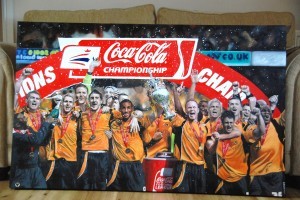
Stephen Benton, a sportswriter, notes the impressive turnaround in the fortunes of Wolverhampton Wanderers since being taken over by China’s Fosul Group in 2016: promotion back to the top flight last season and currently seventh top after another fine result, 3-1 winners at Everton. And he raises question about the powers behind the sport …
After a change in their club’s ownership, all Wolves fans in Wolverhampton had a wonderful year.
The new owners – a Chinese investment group called Fosun International – booted out the manager Kenny Jackett (the chief executive officer Jez Moxey stepped down on his own), replacing Jarrett with Walter Zenga and then Zenga by Paul Lambert before finally settling for Nuno Espírito Santo, a Portuguese international at various levels though he never won a full cap.
And with the close involvement of superstar sports agent Jorge Mendes, the team signed a dozen players. The result: Wolves finally returned to the Premier League after being out of it for six years.
Good football, it seems, needs a lot of investment – and this seems to pay off. The new owners of Wolves certainly pumped quite some money into the team for it to improve this fast. But this leads to a rather unsettling question that’s not very easy to answer: who are the owners of football? It’s easy to find out who owns individual teams – but who reaps the profits of the sport itself?
When it comes to international competitions, the answer closest to reality would be FIFA – the International Federation of Association Football.
FIFA doesn’t make the rules, though – thus, it doesn’t control the sport itself but only its biggest international championships.
The rules of the game are made by the International Football Association Board (IFAB), founded in 1886. Still, FIFA holds half of the voting power on IFAB’s board, and this puts it pretty much in the control of many decisions regarding the sport itself.
The IFAB is a non-political, non-religious and not-for-profit organisation, and it convenes only twice a year. In short, it has all the power and pockets none of the money.
FIFA pockets all the money from the international competitions it oversees: the World Cup (and Women’s World Cup), the Confederations Cup, the Club World Cup, even the major futsal and beach soccer competitions, not to mention the e-World Cup, an e-sports competition held by FIFA and EA Sports.
Below FIFA, there are the continental leagues – UEFA in Europe, CONCACAF in North America, CONMEBOL in South America, AFC in Asia, CAF in Africa and the OFC down under. All of these have FIFA as their parent organisation. Below these, there are the national associations, regional leagues, and so on…
The world of football is a pretty complex and stuffed hierarchical tree with powerful organisations making the rules on the top and the teams trying to make a living – and, perhaps, a decent profit – at the bottom.
But this doesn’t tell us if there is an organisation or association that would be the owner of the sport as a whole. And, perhaps, it’s for the better.
Super rich owners, vast sums of TV cash, agents and hyperinflated payments to a handful of players has created a huge disparity between a few clubs and the rest.
Here is the dilemma. I want Sunderland to be challenging for trophies but I’d rather they could do so without going the way of Man City, Chelsea etc. but since the Premier League began the vast majority of clubs in the top flight are at best playing for 6th place downwards.
As a supporter I want the club to do well but in truth I am enjoying this season more than most of those we spent in the Premier League. This season feels like going to proper football again.
Pete don’t be drawn in. I went to the Blackpool game…did Brian?…the fans cared greatly. Brian conflates the fans of his club who prostitute themselves to Ashley with others who really do care…i won’t bore you with my credentials…but I’m quite impressed with our owners
Fans of smaller clubs don’t seethe….they embrace the experience….i’m desparately trying to get tix for Accrington….just to watch them turn into a seethe…a nod to Blackadder 2nd series
It’s a sad fact of life in football these days but most fans couldnt give a monkey’s who owns their club if said owners are splashing the cash.
Fans of less wealthy clubs may sneer at the provenance of clubs like psg or chelsea but it is seething jealousy camoflaged as righteous indignation.
Is this the same Brian? I ask because I find myself more or less in agreement.